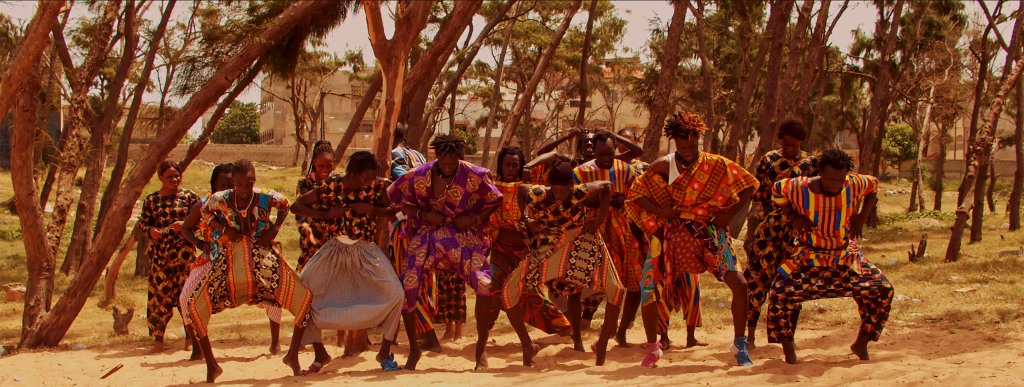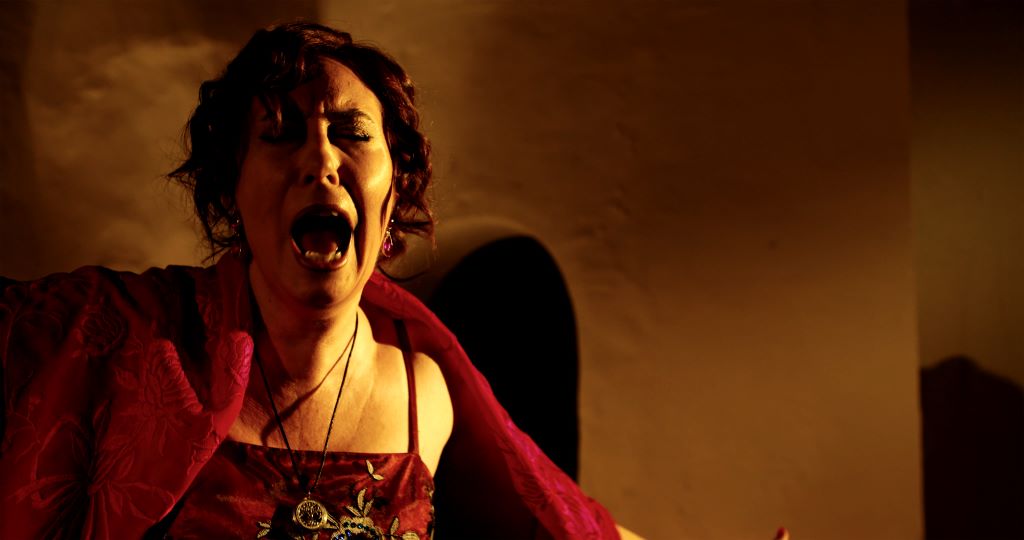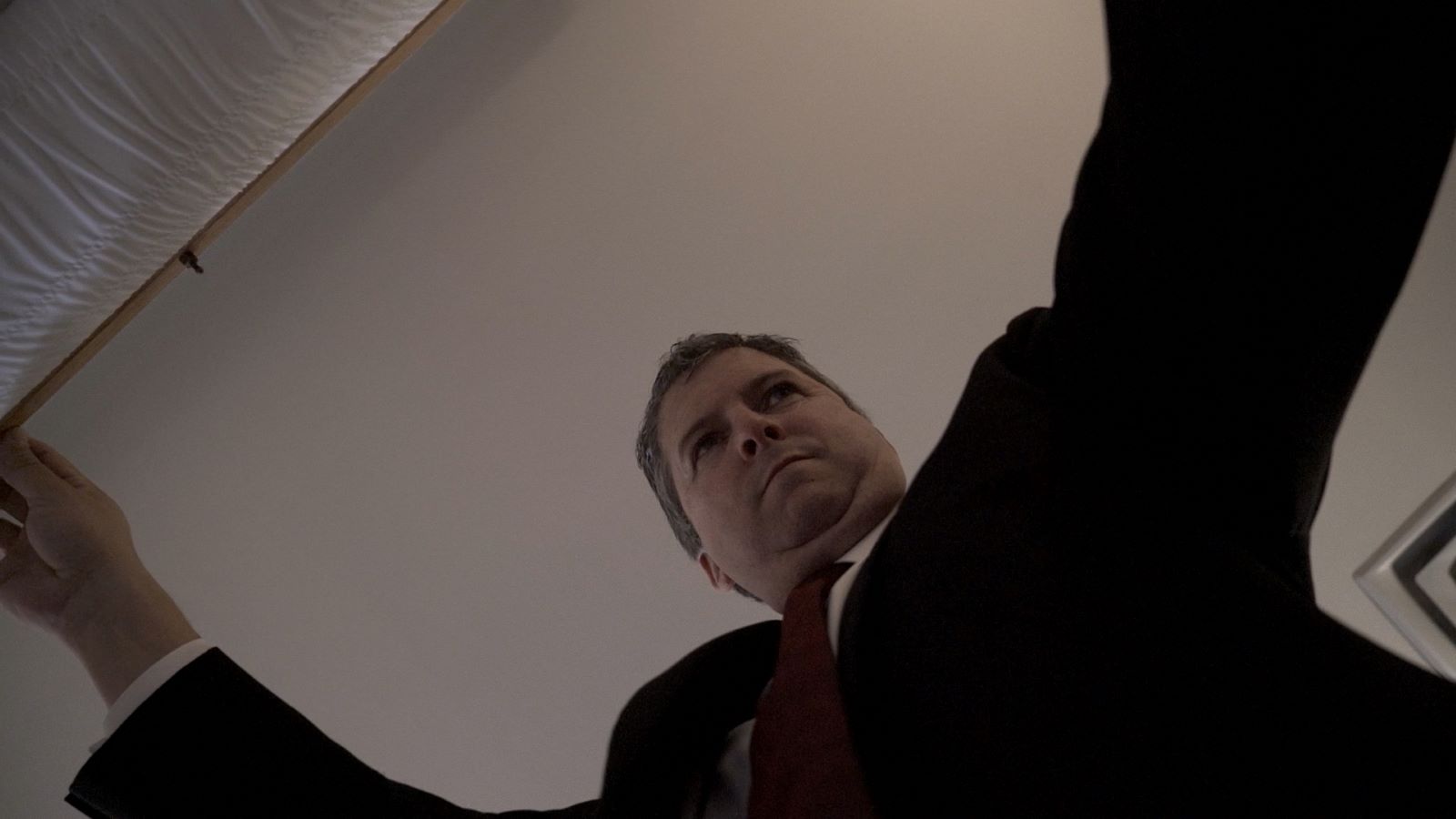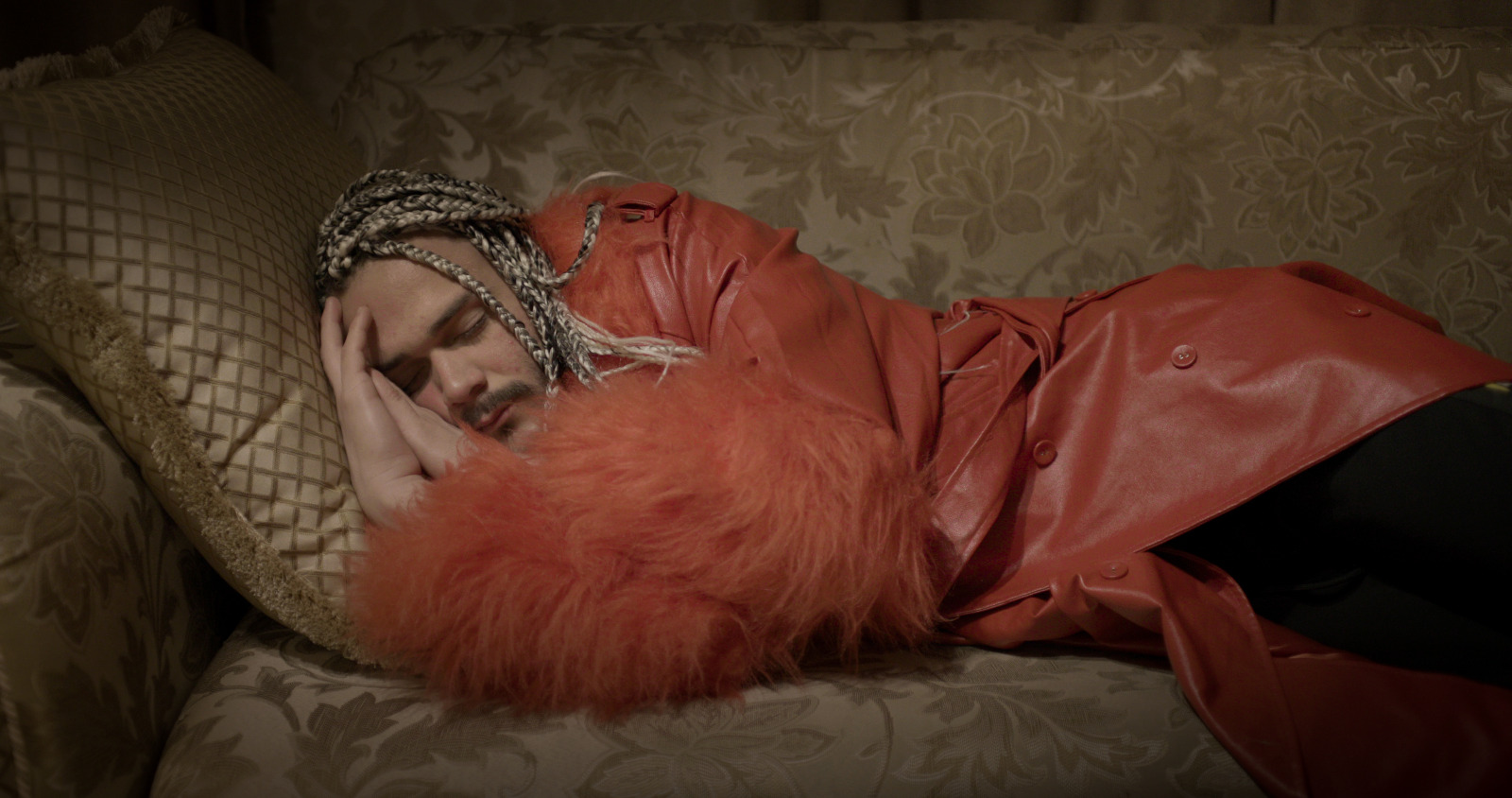Cam Christiansen is on a spiritual journey. The metaphysical river that he follows is fed by the ecstasy of musical expression. The poet Federico García Lorca spoke of “duende,” a near diabolic force that shapes both performer and listener alike, profoundly affecting one’s spirit in ways that some believe preceded our use of verbal syntax. Christiansen’s documentary Echo of Everything provides a virtual travelogue through many places in the world with various forms of group connections to music and movement, coupled with cerebral ruminations on the very nature of the physical universe and how it harmonizes with the frequencies of our experiments in audio.
With his collaborator Andy Curtis helping recreate moments of epiphany while dressed in costumes echoing Robert Wiene or F.W. Murnau’s angular creations, Echo of Everything is a wild ride of colliding imagery mixed with blissful interludes, trying through various trajectories to uncover truths about something as ephemeral as our adoration of musical performance.
POV spoke to Christiansen while he was in a cold and damp cottage in Italy, just prior to the film’s World Premiere at Hot Docs 2023.
POV: Jason Gorber
CC: Cam Christiansen
The following has been edited for clarity and concision.

POV: You have mentioned that this project started during COVID lockdown. Can you talk about what role that had for you while you were isolated?
CC: The effect of lockdown on the project was huge. I had wanted to make something related to music and, like everybody, all of my plans got tossed out the window. I was going to focus on something local, and it was an incredibly different project. When I was considering I’d work remotely with other people, to social distance and all of that, I thought, “Well, shit, if I do that, I can do it anywhere in the world! I then did things in Africa, Paris, and New York. The first ones were slightly terrifying because you’re spending a lot of money, and you don’t know any of these people you’re working with. You’re just hoping you can parse their nature through Zoom calls and things like that, and then you roll the dice.
POV: Let’s talk about the specifics of that. You’re shooting dancers and musicians in Africa, you’re shooting stuff during the George Floyd protests, breakdancers in New York and people in Paris. Is it a matter of looking for somebody on the ground who’s going to shoot this stuff for you, or are you looking at footage that’s already been captured?
CC: I really tried to shoot with intention. I had a script that I was following, an outline to look at why music’s powerful. I had done a ton of research on this topic, read all of these famous books, like Music and the Brain and Musicphilia, and then I went down all these other rabbit holes, like Stephon Alexander’s The Jazz of Physics. But I was also thinking about my personal experience learning to play guitar in my 40s, and I arrived at a direction where all these elements play a part of an ecstatic musical moment. The most fundamental primal aspect of music is rhythm, and given human history is thought to have derived from Africa, I thought about how we had music before we had language. It’s not proven, but there’s a theory covering that, which is mind-blowing!

POV: Is it literally a matter of Googling “drum groups in West Africa”? What are you doing to actually make this happen, and how are you directing around the world from Calgary?
CC: It was a bit of a meandering process. I was really driven by academics and authors. One of them was this Danish neuroscientist by the name of Peter Voost who I profiled but I ended up cutting from the film, unfortunately. He’s a brilliant guy who introduced me to this Oxford neuroscientist. His wife happens to be an anthropologist who studies African dance, and she’s Senegalese. Through her, I contacted their manager. That particular project took, like, two years to shoot. Not only was COVID a nightmare, but I had told him that the footage had to be in 4K resolution. They get 60 people together, they do a dance shoot, and it was lower resolution than a cellphone! I couldn’t use a single thing, so they had to do it again. Then there was a flood, with six feet of water floating through the streets.
Apparently Senegal is really quite stable politically, but weirdly, there was a bunch of civil unrest, and so this thing just went on and on and on. But I really got to know them through this process. One of them told me they were going to this healing ritual. I was originally going to [record] a normal dance performance with them. When I got the footage back, I thought immediately that if I had flown over there and tried to shoot that, I would never have gotten those images. It was a really cool way of working because you’re just trusting them to go do stuff.
POV: Obviously there’s a lot of musicological, anthropological, and ethnographic elements, but there’s also surreal elements, and highly theatrical ones, including from your collaborator Andy Curtis. Can you talk about that aspect of the film?
CC: Originally, I was making a very standard documentary. I like to send out stuff while I’m working on it to friends and to people, just to get reactions. People were telling me things like that it’s beautifully shot or really interesting, but they didn’t really get why I was doing this, that it was a collection of facts that didn’t really add up to something. I struggled with that for a long time, actually. That’s when I reached out to Andy Curtis. I was talking to him, saying this material isn’t connecting with people emotionally. With Andy, we came to the decision that I needed to insert my personal narrative. I was talking about music in really rational terms.

The problem for me was that I didn’t want to go on camera and go, “Hey guys, my name’s Cam and here’s my personal story.” Nobody wants to see that. Even I don’t want to see that! It was Jules Evans who suggested this concept of “duende” and the story of Federico García Lorca. I found that finally somebody’s writing about what the experience of playing music is like—how it is like a demon or spirit. It’s fickle, as one night you play in front of a bunch of people, it’s magic, everyone loves it, and then you do the exact same songs, in a different crowd, and it’s just flat. Lorca was the lover of Salvador Dalí, and, of course, I love all of the surrealist stuff from the 1930s and ’40s and all of those films from Buñuel. Lorca gave me an excuse to dive into surrealist imagery as a counterbalance to this rational, quasi objective truth I was going after with the science.
POV: There’s some famous line that writing about music is like dancing about architecture, that it’s nearly impossible to articulate. Surely there must have been moments when using the medium of documentary to talk about something as ephemeral as musical ecstasy was, to say the least, daunting.
CC: Every day I had enormous self-doubt. The whole project felt like an act of hubris. It’s a grandiose idea in the first place. Do you play music, by the way?
POV: I do, poorly. I’ve had fewer ecstasy moments playing music than listening because of my skill level. I was a horn player, but I could never do “Giant Steps.” I play piano, but feel useless. I’m no Herbie Hancock.
CC: I’m definitely not a virtuoso musician! One influence for me musically was that I got hooked up with this thing called the Foothills Acoustic Music Institute. I describe it as a camp for adults, these workshops where you go and you spend three days at a YMCA camp. You’re literally in bunks and it’s just wonderful. It’s all ages, all skill levels, and all acoustic music. All you do is you take classes in the day and then at night, you jam and you have opportunities to perform and there are little cabins everywhere. You play bluegrass, classic rock, swing music, jazz, whatever. We’d stay up until three or four in the morning every night. It’s absolutely exhausting but it’s wonderful. Through that, I met all of these incredible singer-songwriters, and I started writing songs myself. In the film, I show my character lying in my cabin at that camp. That was the genesis of the project.

POV: Were there specific films that you looked for ways of dealing with something so esoteric and in a different medium?
CC: I don’t know if you remember that Coen brothers’ movie about the Greenwich Village musician…
POV: It’s called Inside Llewyn Davis.
CC: Anyway, T-Bone Burnett made a music doc associated with that. Do you know the one, Another Day, Another Time? It’s a terrible name, but the movie’s incredible. It’s got Patti Smith, Jack White—all of these amazing artists. I’d finished my other film that I had spent eight years on. I was exhausted mentally, and was in a terrible headspace. That other film was political, about Israel and Palestine. I just want to do something fun! But like I said, with the pandemic, everything went to shit. It was actually [through] Stephon Alexander’s book that I realized I could make a film about this. I’ve spent so many years working as an animator that I realized that when he’s talking about physics, he’s talking about particles and frequency—vibration, all of this stuff, that you can’t film to show. I thought this might be a great example of using animation with purpose because it can tell a story that you can’t tell in other ways.
POV: Was Fantasia a major influence on you?
CC: Not really. It’s weird, I’m an animator, but I don’t really like animation much.
POV: You’re a documentarian. Do you love documentaries?
CC: I love documentaries. Absolutely. It’s weird. I kind of wound up making a bunch of animation stuff but it was like all a weird coincidence. I’m in love with Werner Herzog’s films; he changed my life for real. In a way, this film is like one of his, with the audacity of saying I’m going to try to understand the power of music. I would never have thought of that unless I ran into Werner Herzog, who has gargantuan ideas. This film started in a real personal crisis, and if you’re having personal problems, or issues of depression, or anxiety, music provides such a cathartic release.

I actually grew up in a really religious environment, and my father is a minister. I was indoctrinated into that way of thinking. But Christianity was never comforting for me. When I started reading all about the physical nature of music, that inevitably tells you how we all come from stars—we’re just all these little particles that have all gelled together. Studying the physical nature of music is at the vanguard of all modern theoretical physics.
Jim Peebles is a modern theoretical physicist from Winnipeg who won a Nobel Prize, and he talks about how thinking of the universe in musical terms is actually a great analogy in terms of harmonics and frequencies and so on. Basically, I found it all more spiritual and more beautiful to investigate the reality of music. It became comforting for me on an existential level.
POV: You mentioned Winnipeg, does Guy Maddin have any effect on your style or your tonality in terms of the creation of this film?
CC: I’m completely aware of Guy Maddin and I knew when I started doing all of that old school, there’d be some comparisons. I’d say it was actually a friend of mine, Karen Heinz, who made a bunch of films, who I was more inspired by.
POV: Please give me a song that didn’t make it into the film but gives you that sense of ecstasy.
CC: That’s pretty easy. The one that jumps to mind immediately is Simon and Garfunkel’s “The Only Living Boy in New York.” I don’t know if you know that song. Do you know it?
POV: Of course, I would say the same about “America,” actually.
CC: I would say that one too. But in “The Only Living Boy in New York,” they have almost this angelic thing where they’re doing “ahhhhhh…” I get shivers. I think you can achieve that same type of thing with EDM or dance music, for example. I remember once being an artist in residence out at the Banff Centre and there was this British D.J. who had all of these professional dancers. We got swept up into this wonderful rave music. It was totally primal, and I remember floating off into space with no drugs at all. Another time, I went to this vocal choir: There were three choirs on stage; they couldn’t even fit them all on the stage there were so many people, with adult choirs and one children’s choir. They couldn’t fit them all on the stage, so they were all down on the front and the aisles. There’s something about children’s voices blending with adult voices that gives me shivers just thinking about it. That was transcendent. Harmony gets me in this deep way. I saw Leonard Cohen in concert and he played with these two sisters who were doing backup.
POV: The term is “blood harmony.” That’s what they call it in country music, so the Beach Boys, the Everly Brothers, all of that.
CC: That is transcendent too. Something magical about that. I could keep going on and on.











